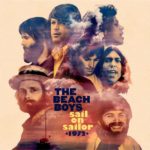Sail On Sailor: 1972 marks a crossroads for The Beach Boys. Not only was it a time musically when the band shifted in sound and substance, but also in symbolism. The quintet expanded to a septet, grew their hair long, and mostly left behind the decades’ worth of songs about cars and girls.
The two more affecting changes came in the forms of a new manager- Jack Rieley- and two new musicians- drummer Ricky Fataar and guitarist Blondie Chaplin- both South Africans who, ironically, pulled the Boys closer to the current California sound that blended country and folk. For his part, Rieley encouraged the band to embrace the social causes of the day- environmental awareness; the war in Vietnam- and even lent his pen to some of the songwriting efforts that eventually became a pair of albums in 1972: Carl and the Passions- “So Tough” and Holland.
Notice that Brian Wilson, the groups’ creative furnace who had been anointed with “genius” status following Pet Sounds in ’66 and the sessions for the aborted follow-up, Smile, has yet to be mentioned here. Instead, as Wilson’s writing and general participation in the group receded, the Boys became more democratic; Brian’s brothers, Carl and Dennis, assuming much more prominent roles. The more soulful work on “So Tough” reflected, too, another transition: as frontman Mike Love, while still a lyrical contributor, was singing far less of the lead vocal.
Where Love makes his most revealing impression is during the six-CD set’s centerpiece- the two-disc complete concert recording from Carnegie Hall in November of 1972. By way of introducing some new material, Love severely lays into some disruptive audience members. The days of the clean-cut SoCal boys in matching shirts and endless summers have become nights of “Leaving This Town” and “Student Demonstration Time.”
As for Fataar and Chaplin, their contributions are quite consequential: Their Byrds-like “Hold On Dear Brother;” their echoes of CSNY on “Here She Comes;” their nod to The Band on “Oh Sweet Something.” Leave it to the South African ex-pats to get The Beach Boys in touch with some American roots music. By the time of Holland, Brian still sneaks in a veritable classic with “Sail On Sailor,” yet even that carries conspicuous co-writing credit from four others, including Rieley. Only his sweet and child-like “Mount Vernon and Fairway (A Fairy Tale)” is a stand-alone Wilson composition (and one left off the album; revived on a later CD issue).
The Carnegie concert is the symbolic, if not sonic, sometimes difficult melding of past with (then) present. The audience is twice given strict instructions not to shout out song requests. And while the run of “oldies” that closes out the show is received with ecstatic applause- and performed with a newfound and rocking slant- it is clearly in the rear-view. It would take a decade more before The Beach Boys would circle back to the fun in the sun- oddly as America’s band during the Reagan years. And, for the most part, under Love’s helming, they’ve remained that for the last four decades.
From the overhead view, the subsequent 50 years since ‘72 have made this period a bit anomalous to what followed. And why this strikingly thorough set filled with session outtakes, live cuts, and new mixes, in addition to the wonderfully remastered versions of the two albums, is all the more vital to the story. After 1973, Fataar and Chaplin would sail off to other horizons. Rieley’s effect as a positive would come into question. Left behind was a Beach Boys era of change; the shedding of innocence and youth in favor of growth and maturity- not unlike America, post-Vietnam and post-Watergate. Give the Boys their due: They sailed an unsettled ocean; heartbreak searing, always fearing, never caring, persevering.



No Comments comments associated with this post